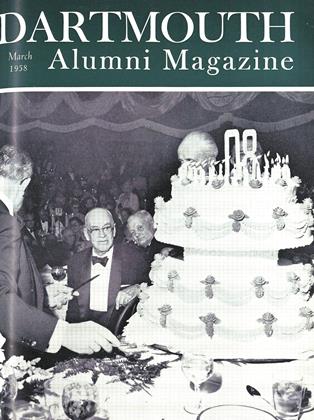ONE of my students in my American Thought course loaned me a book recently which I enjoyed very much. In fact so much so that I may try it out as a text. This is The American Conscience by Roger Burlingame published by Knopf in 1957.
Mr. Burlingame sees the American conscience in the constantly shifting moral judgments of the people themselves; as the flux of public opinion under religious compulsions, intellectual forces, economic pressures, and emotional explosions. His book is an inquiry into three centuries of American behavior, to the end that we may understand what we were and are. The American conscience, Mr. Burlingame notes, is a synthesis of various influences - theological, ethical, cultural, political, and economic. The sections of the book are titled: the provincial conscience, the awakening and enlightenment, the revolutionary conscience, manifest destiny, the regional conscience, and the national conscience. The book discusses the American conscience from Colonial times through the first World War and the incredible prohibition era. This may be read almost like a novel and I recommend it highly.
From London I bought recently a magnificent new reference book: The OxfordDictionary of the Christian Church, edited by Dr. F. L. Cross. There are 1492 pages and the curious reader may find here almost every conceivable topic which concerns the Christian Church. Handsomely printed, this will undoubtedly be available soon here in the United States.
While on my professional work, let me say that in my course on English Thought, from Bacon to Shaw, I have found an admirable text by Dennis Brogan: The English People. Mr. Brogan is well known over here, understands this country probably the best of all Englishmen of our time, and writes entertainingly. Knopf published this, too. I've recommended this before.
Parents could read with profit an excellent book by a distinguished young Dartmouth doctor, a friend and former student of mine, Berthold E. Schwarz '46. It is called Parent-Child Tensions and discusses many problems of conduct and personality which disturb parents. Lippincott is the publisher.
A valuable book for anyone remotely interested in contemporary American thought is a book, edited by Philip P. Wiener, called Values in a Universe ofChance. This is an anthology of the writ, ings, from 1914 to 1939, of Charles S. Pierce, who was a pragmatist long before William James. This is an Anchor Book and it should have a wide circulation among the intelligentsia.
Diana Trilling has done a competent job in her edition of the Selected Lettersof D. H. Lawrence (Farrar Straus). Lawrence tends to bore me with his sickly egotism but this book throws much light on his undoubted genius.
As Henry Adams is one of my favorite American writers, I hasten to recommend to all and sundry A Henry Adams Reader, edited by Elizabeth Stevenson and published by Doubleday. Miss Stevenson has wisely chosen to exhibit Adams not only as historian and autobiographer, but also as novelist, journalist, letter writer, poet, medievalist, and biographer. It is to be hoped that these selections from a "strongly idiosyncratic writer" may turn the reader to his stimulating Mont St.Michel and Chartres, his Education, and to some of his essays. His nine-volume history of the Federalist period is still standard.
I am at present working on a paper concerning the wit and wisdom of Sir William Osier, for an address to be given a year from now in Philadelphia. Fortunately there has come to hand through the kindness of a good friend of the Dartmouth Library, Gilbert Verney, of Bennington, N. H., a volume called The Student Life, an anthology of Osier's writings made by Richard E. Verney of Edinburgh. Here one finds such essays as "The Student of Medicine," "The Foundations of a University Education," in which he emphasizes humanistic studies, "The Christian Way of Life," and others equally good. The publisher is E. and S. Living-stone of Edinburgh and London.
Moon of the Tiger by Oswald Wynd is a good adventure story of Malaya. This may turn you back to Graham Greene's admirable The Quiet American. Basta!
 View Full Issue
View Full Issue
More From This Issue
-
 Feature
FeatureThe State of Our Purposes ... and Vice Versa
March 1958 -
 Feature
FeatureA Spot of Green at Knob Lake
March 1958 By ALAN COOKE '55 -
 Feature
FeatureA BIG NIGHT AT THE WALDORF
March 1958 -
 Feature
FeatureAlumni Council Has Record Attendance
March 1958 -
 Class Notes
Class Notes1918
March 1958 By ERNEST H. EARLEY, W. CURTIS GLOVER, RICHARD P. WHITE -
 Class Notes
Class Notes1930
March 1958 By RICHARD W. BOWLEN, WALLACE BLAKEY, JOHN F. RICH
HERBERT F. WEST '22
-
 Article
ArticleHANOVER BROWSING
February 1936 By Herbert F. West '22 -
 Article
ArticleHanover Browsing
February 1944 By HERBERT F. WEST '22 -
 Article
ArticleOn the Construction Front
October 1951 By HERBERT F. WEST '22 -
 Books
BooksSPINDRIFT
November 1951 By Herbert F. West '22 -
 Article
ArticleHanover Browsing
October 1954 By HERBERT F. WEST '22 -
 Article
ArticleHanover Browsing
October 1951 By HERBERT F. WEST '22








